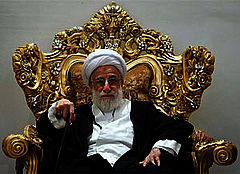Janati: Eating Meat is not Very Good
» More on What is Good to Eat and Wear
Ahmad Janati, the aged and influential Friday prayer leader of Tehran who earlier this year too criticized Hassan Rouhani’s administration for its nuclear diplomacy and called on the public to bear out the pressures caused by international sanctions by famously saying, “What is wrong if we have to eat just one meal a day if conditions become worse,” made another headline this Friday when he proclaimed during this week’s congregational prayers that “Eating meat was not a very good thing: we prefer to preserve our dignity and keep our stomach hungry.”
He also again presented his critical remarks regarding the nuclear talks and said, “Some are naïve about the nuclear issue and many do not know how decisive the issue is regarding our destiny. Others are indifferent and think the issue is not important to begin with. Some believe that with an agreement and the lifting of sanctions the enemy will end its animosity. They think if we accept an agreement they will come to our side. They are optimistic about the great Satan and other satans and do not understand the issue as they should.”
Janati is a fundamentalist cleric and chairman of the powerful Guardians Council, a 12-man appointed body that oversees all the laws in the country and vets all candidates for national elections – a post he has held since 1980. His son is the current minister of culture who is regularly under fire from the hardline Principlists.
At his Friday sermon, Janati expanded on his message. “Nobody should think that people cannot tolerate hardships and be thinking about providing their bread and butter at any cost.” He then took a jab at president Rouhani: “Some even say incredible things. In some meetings they have expressly said, and I am shocked at this, that our economy and financial conditions are not good and that we have no reason but to surrender, that the country cannot be run and that the sanctions will remain and things will disintegrate. They of course do not say surrender but something like it. They also say that people will not tolerate such things any longer.”
Janati then quoted a remark by ayatollah Khomeini, the founder of the Islamic regime, to add credibility to his views. “We are a nation that have got used to being hungry and we prefer to keep our dignity and remain hungry. Believing in people means that people have accepted ayatollah Khomeini’s path and have followed it to come to this point. After all, hunger is not worse than being martyred. Does a person who has given four sons to martyrdom say we should avoid hunger and that he cannot bear hunger? Or does he say the enemy should return to his position?”
The cleric then turned to the nuclear talks and said, “The negotiations team must take into account the views of the supreme leader, the red lines, dignity, exigency, the honor of the revolution, Islam and people and maintain them. They should do their job. We on the other hand must know our duty, we must oversee and resist. It is worth it. Imam Hossein (a reference to the Muslim leader who was killed in the deserts of Karbala in the first millennium of Islam) and his entourage were killed, but Islam was reborn. Let us die too and Islam will continue to live.”
He then turned to meat and said, “Eating meat is not a very good thing and just one meal a day can be sufficient. We prefer to keep our dignity even if we have to remain hungry.”
In the religious city of Qom, where the famed Qom Theological Seminary resides, cleric Alireza Erafi sounded a similar message. “The Iranian nation will not negotiate its dignity and standing with any.”
This is of course not the first time appointees of ayatollah Khamenei criticize nuclear talks launched by Hassan Rouhani and have called for “resistance” of economic difficulties caused by international sanctions where they have also preached on what people should eat and wear. In March, Ahmad Elm al-Hoda, the Friday imam of Mashhad said pretty much the same. “The economy can be run without relations with America.” He compared the conditions of the country to the days when it was at war with Iraq (between 1980 and 1988) and said, “Did you think of dinner the night before a military operation? We are at war today. The attack is economic and cultural. The supreme leader has introduced resistance economy. If this is not implemented, then it is the fault of people and the government. We must implement it.”
Since coming to office about two years ago, Hassan Rouhani has repeatedly announced his intention of improving living conditions in Iran by lifting the international sanctions and establishing relations with the world. Early in his office he announced that the “The treasury is empty.”
Supporters and appointees of ayatollah Khamenei on the other hand downplay the effects of international sanctions on the Iranian economy and people and call on people to persist while at the same time pushing for the expansion of the country’s nuclear program.
As the current round of negotiations between Iran and the six major powers approaches, hardliners in Iran have increased their criticism of the nuclear talks and Rouhani’s foreign policy, presenting new “red-lines” to the negotiators.
Another event that is driving this greater criticism of the relatively moderate administration of Rouhani are the two upcoming national elections, one for the parliament and the other for the Assembly of Experts that theoretically acts as the watchdog over the supreme leader. Both are planned to be held early next year.


